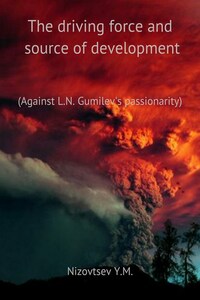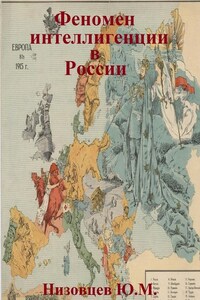Nizovtsev Yu. Science, Philosophy, History and Politics
The driving force and source of development of the person and his communities
(Against L.N. Gumilev's passionarity)
Contents
1. Analysis of the main views on the driving forces of the development of society.
2. Dynamics of local human communities in LN. Gumilev's reflection.
3. The driving force of the development of society.
4. The primary source of activity.
4.1. Essence of human activity.
4.2. Manifestation of dissatisfaction of consciousness in the person.
5. Definition of a holistic community.
6. Dynamics of activity of the holistic community.
1. Analysis of the main views on the driving forces of the development of society
The inadequacy of the basic concepts that claim to identify the driving forces or the driving force of the development of society can be traced from a comparatively brief analysis below.
Approaches to identification of sources, reasons or driving forces of development of society are divided into two primary groups: one of them is made of representatives by idealistic philosophy, another – materialistic.
Idealistic philosophy, in particular, Hegel, pointed to the notion far from concreteness, – public consciousness which, according to him, and is the main source of social development, and only it one determines it, whereas the materialistic philosophy, for example, Marx, on the contrary, believed that only public life and activity determine the public consciousness.
As can be seen, both approaches do not prove, but merely declare their understanding of the problem, mentioning only the external expression of hidden antagonistic forces, but they do not open them, and therefore the entire history of determining the driving forces of social development shows the searches and finds of various external factors, often far from each other, more or less influencing the course of development of society, i.e. the antagonism of the basic components of human and social consciousness has not been revealed.
The visible does not mean penetration into the depth. Therefore, even a brief analysis of the factors listed below, which are considered by their authors to be the primary sources, the reasons or the driving forces of the development of society, shows that they cannot be as the primary, but they are derivative, secondary factors which only contribute to the transition of the deep antagonism in the human and social consciousness into social development, and some of them are just the conditions for social development.
Materialistic analysis of the problem allocates as the driving forces of the development of society the factors mostly of a natural-structural character.
C.L. Montesquieu has considered as the source of social development the geographical conditions and the environment: "The law, generally speaking, is a human mind, inasmuch it governs all people of the earth … They (laws) have to correspond to physical properties of the country, to its climate – to cold, hot or moderate, to qualities of the soil, its situation, sizes … in the countries, which are fertile, more often happens the ruling of one, and the infertile countries are ruled by a few, that is sometimes as if by kind of compensation for adverse natural conditions" [1, p. 168, 393].
Certainly, natural conditions are an important factor for existence – less or more favorable, but not more than that, since they are just one of many external factors – exactly conditions that can somehow affect the life of communities – but they are not the driving forces of development. In addition, as the history of primitive communities shows, regardless of geographic conditions and the natural environment, for tens of thousands of years no visible development was observed for these communities.
J.J. Rousseau believed, that the number of population should be attributed to the driving force of social development: "Before the invention of special signs, replacing all values, wealth could consist almost exclusively in lands and herds of livestock, which were the only actual good things, which people could own. But when the land ownerships, passing by inheritance from generation to generation, so increased in number and size, that they covered by themselves the whole earth and came into contact with each other, then some were able to grow only at the expense of others. Those people who did not do anything, because weakness or carelessness prevented them, in turn, to acquire land, became poor, without having lost anything, because they did not change when everything changed around. From here little by little arose domination and slavery or violence and robberies, depending on differences in character of that and others" [2, p. 83].
Free occupation of the land plots, proportional to the increase of the population really does end once with all the ensuing consequences, but this fact is difficult to consider as primary and determining in the development of communities, since it does not indicate the reason of the population growth and, therefore, it is an external factor, and not primary.
D.E. Durkheim considered the social differentiation of labor as the main driving force of the development of society, because he believed that, unlike simple communities, where people are connected by personal relationships, interests and traditions, people in modern large communities increasingly rely on each other due to differences in their own specialization. At the same time, Durkheim considered the growth of population and population density to be key factors in the development of society [3, p. 106; 4, p. 125].
Certainly, a sufficient number and density of the population favor to emergence of various crafts, and then – to the differentiation of labor to facilitate and improve its productivity. All this, naturally, can be carried to the favorable conditions promoting emergence and fixing of the property rights, and accordingly – towards the development of trade, cities, states and much more, but all these factors are only the outer framing of the process of the development of human and its communities. Therefore, the question remains of what after all drives people to move forward in case, if the favorable conditions arise.
K. Marx tried to prove that the driving force of social development is the contradiction between needs of people and opportunities of their satisfaction which is being allowed in the struggle of the productive forces of society and the tools of labor, as well as – in the struggle of owners of the manufacture, against a class of employees on this manufacture [5].












